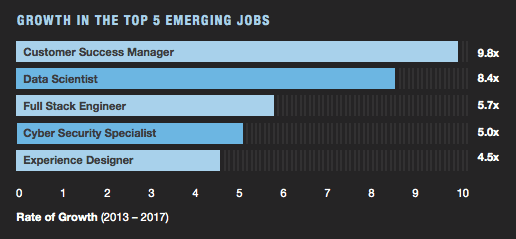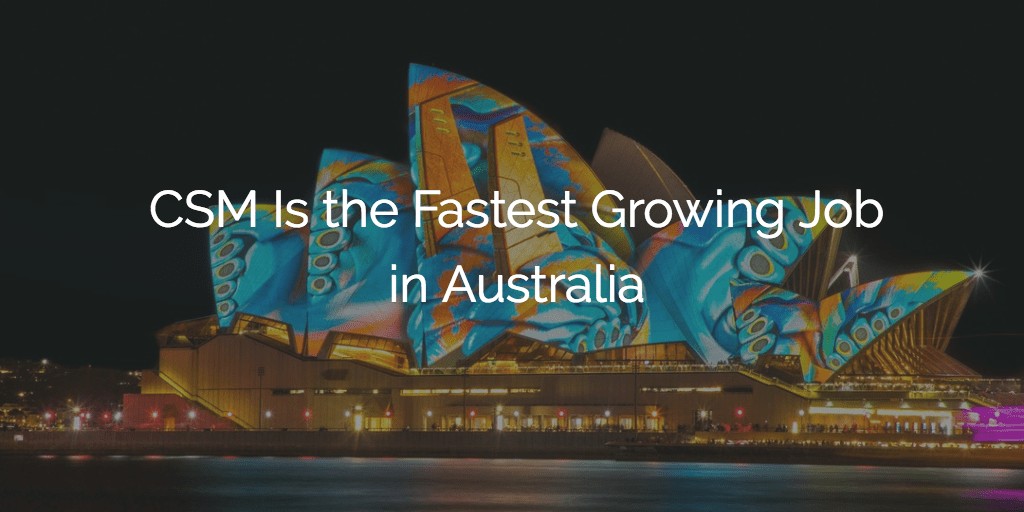LinkedIn Talent Solutions just released its latest report on emerging jobs in Australia.
If you’ve been keeping an eye on trends in employment (not just in the Asia-Pacific region, but globally) you won’t be surprised to see CSM at number one on the list. Customer Success Manager has been among the fastest growing careers on the planet.
What is Customer Success?
If you’re just hearing about CSM, you may be surprised to see it at the top of the emerging jobs report ahead of core STEM roles. I recommend you take a look at our Essential Guide to Customer Success Management for an in-depth breakdown of the discipline, but let’s first understand that Customer Success is much more than just a job. It’s a much larger movement in business. It encompasses people, process, and technology—all working together to help customers achieve their desired outcomes with the products and services they buy.
But why do businesses care whether customers they’ve already sold to achieve those outcomes? Why does it matter to them when the money’s changed hands?
The one word answer is churn. Customers don’t renew when they don’t get what they paid for. You can’t grow revenue when you’re bleeding customers, and you can’t acquire new ones fast enough (or cheaply enough) to replace customers—especially when they have more power than ever before to spread negative word of mouth about your company.
Customer Success is the ONLY way to predictably and scalably prevent churn, improve upsell, drive advocacy, and otherwise protect and grow recurring revenue in the Age of the Customer.
So it makes sense that over the last five years, CSM has grown by 5.6x in the United States—it’s the fourth fastest growing job. It’s the sixth fastest gowing job in India. It’s making gains in almost every industrialised economy on the planet.
But even though LinkedIn’s data on Customer Success hiring is clearly in line with a larger worldwide trend, the rate of growth is far ahead of that trend. Between 2013 and 2017, CSM has grown 9.8x—ahead of Data Scientist (8.4x), Full Stack Engineer (5.7x), and Cyber Security (5.0x).

Source: LinkedIn
The Largest Customer Success Event in Australia
The timing of this report—just a few months ahead of the first ever Pulse conference in Sydney—is extremely validating for the Customer Success community in Australia. It’s so empowering to know you’re not out on a limb with your choice of career. Whenever we host Pulse conferences, the most consistent piece of feedback we’ve gotten going all the way back to the first Pulse in 2013 has been, “Thank you for showing me I’m not alone in this!”
If you’re a CSM and you’re reading this, LinkedIn’s report is hard evidence you’re not alone. I hope you’ll join us at Pulse APAC in December; it’s one thing to see the evidence, it’s another to actually see it in person with your own eyes!
Okay, the shameless plug portion is over, let’s talk about the takeaways from this data. There are three main insights to cull from the report:
1. CSM is not just for SaaS
With a growth rate like 9.8x over five years, it’s impossible that all that hiring is taking place in just SaaS. In fact, more legacy industries (like industrials, healthcare, financial technology, and others) are moving towards SaaS-type models. Collecting usage data and increasing Customer Lifetime Value are obviously attractive to businesses. And Customer Success is obviously the key to making the most of both.
2. Customers are the most precious resource
So why CSM? And more importantly, why now? Businesses don’t invest the kind of money they’re investing in hiring Customer Success Managers based on what’s “trendy” or simply because “everyone’s doing it.” They’re betting big on CSM and that bet had better pay off. But when you think about what the scarcest (and therefore, most precious) resource is in the modern business equation, it’s clearly the customer. In the past, natural resources were the limiting factor in balancing the supply and demand equation. These days, it’s paying customers. Successful businesses have always invested in protecting and growing their most valuable assets, and in 2018 and beyond, that investment is being made in CSM.
3. Soft skills are more relevant than ever
As the entire global educational apparatus shifts to keep up with the demand for skilled software engineers, it can be daunting to imagine your future if you come from an arts or social sciences background. But the emergence of the CSM role is proof positive that even in a high-tech job marketplace, there’s a critical need for so-called “soft skills” such as adaptability, persuasiveness, collaboration, culture fit, and others. As you’ll read in the report, the Department of Jobs and Small Business discovered that 70% of companies value soft skills equally to tech skills in their hiring. As we’ve begun to say, the future of technology is human first.
Read the Report
There’s loads of insight in addition to all the data in LinkedIn’s report. I highly encourage you to take a closer look, especially if you’re a hiring leader at your company.
If you want to learn more about the state of CSM in Australia, LinkedIn will be presenting even more data and insights on the keynote stage at Pulse APAC. Click here to take a look at the agenda!
